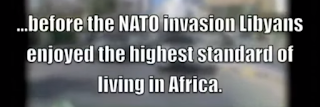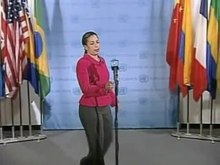...That the standard of living in Libya was the highest in Africa?
- 21 February 2011: Libyan deputy Permanent Representative to the UN Ibrahim Dabbashi called "on the UN to impose a no-fly zone on all Tripoli to cut off all supplies of arms and mercenaries to the regime."[39]
- 23 February 2011: French President Nicolas Sarkozy pushed for the European Union (EU) to pass sanctions against Gaddafi (freezing Gaddafi family funds abroad) and demand he stop attacks against civilians.
- 25 February 2011: Sarkozy said Gaddafi "must go."[54]
- 26 February 2011: United Nations Security Council Resolution 1970 was passed unanimously, referring the Libyan government to the International Criminal Court for gross human rights violations. It imposed an arms embargo on the country and a travel ban and assets freeze on the family of Muammar Al-Qadhafi and certain Government officials.[55]
Hmmmm.
Proposal for the no-fly zone[edit]
Both Libyan officials[39][40][41][42] and international states[43][44][45][46][47] and organizations[18][48][49][50][51][52][53] called for a no-fly zone over Libya in light of allegations that Muammar Gaddafi's military had conducted airstrikes against Libyan rebels in the Libyan Civil War.
Chronology[edit]
- 21 February 2011: Libyan deputy Permanent Representative to the UN Ibrahim Dabbashi called "on the UN to impose a no-fly zone on all Tripoli to cut off all supplies of arms and mercenaries to the regime."[39]
- 23 February 2011: French President Nicolas Sarkozy pushed for the European Union (EU) to pass sanctions against Gaddafi (freezing Gaddafi family funds abroad) and demand he stop attacks against civilians.
- 25 February 2011: Sarkozy said Gaddafi "must go."[54]
- 26 February 2011: United Nations Security Council Resolution 1970 was passed unanimously, referring the Libyan government to the International Criminal Court for gross human rights violations. It imposed an arms embargo on the country and a travel ban and assets freeze on the family of Muammar Al-Qadhafi and certain Government officials.[55]
- 28 February 2011: British Prime Minister David Cameron proposed the idea of a no-fly zone to prevent Gaddafi from "airlifting mercenaries" and "using his military aeroplanes and armoured helicopters against civilians."[44]
- 1 March 2011: The US Senate unanimously passed non-binding Senate resolution S.RES.85 urging the United Nations Security Council to impose a Libyan no-fly zone and encouraging Gaddafi to step down. The US had naval forces positioned off the coast of Libya, as well as forces already in the region, including the aircraft carrier USS Enterprise.[56]
- 2 March 2011: The Governor General of Canada-in-Council authorised, on the advice of Prime Minister of Canada Stephen Harper, the deployment of the Royal Canadian Navy frigate HMCS Charlottetown to the Mediterranean, off the coast of Libya.[57] Canadian National Defence Minister Peter MacKay stated that "[w]e are there for all inevitabilities. And NATO is looking at this as well ... This is taken as a precautionary and staged measure."[56]
- 7 March 2011: US Ambassador to NATO Ivo Daalder announced that NATO decided to step up surveillance missions of E-3 AWACS aircraft to twenty-four hours a day. On the same day, it was reported that an anonymous UN diplomat confirmed to Agence France Presse that France and Britain were drawing up a resolution on the no-fly zone that would be considered by the UN Security Council during the same week.[43] The Gulf Cooperation Council also on that day called upon the UN Security Council to "take all necessary measures to protect civilians, including enforcing a no-fly zone over Libya."
- 9 March 2011: The head of the Libyan National Transitional Council, Mustafa Abdul Jalil, "pleaded for the international community to move quickly to impose a no-fly zone over Libya, declaring that any delay would result in more casualties."[40] Three days later, he stated that if pro-Gaddafi forces reached Benghazi, then they would kill "half a million" people. He stated, "If there is no no-fly zone imposed on Gaddafi's regime, and his ships are not checked, we will have a catastrophe in Libya."[41]
- 10 March 2011: France recognized the Libyan NTC as the legitimate government of Libya soon after Sarkozy met with them in Paris. This meeting was arranged by Bernard-Henri Lévy.[58]
- 11 March 2011: Cameron joined forces with Sarkozy after Sarkozy demanded immediate action from international community for a no-fly zone against air attacks by Gaddafi.[59]
- 12 March 2011: The Arab League "called on the United Nations Security Council to impose a no-fly zone over Libya in a bid to protect civilians from air attack."[48][49][50][60] The Arab League's request was announced by Omani Foreign Minister Yusuf bin Alawi bin Abdullah, who stated that all member states present at the meeting agreed with the proposal.[48] On 12 March, thousands of Libyan women marched in the streets of the rebel-held town ofBenghazi, calling for the imposition of a no-fly zone over Libya.[42]
- 14 March 2011: In Paris at the Élysée Palace, before the summit with the G8 Minister for Foreign Affairs, Sarkozy, who is also the president of the G8, along with French Foreign Minister Alain Juppé met with US Secretary of State Hillary Clinton and pressed her to push for intervention in Libya.[61]
- 15 March 2011: A resolution for a no-fly zone was proposed by Nawaf Salam, Lebanon's Ambassador to the UN. The resolution was immediately backed by France and the United Kingdom.[62]
- 17 March 2011: The UN Security Council, acting under the authority of Chapter VII of the UN Charter, approved a no-fly zone by a vote of ten in favour, zero against, and five abstentions, via United Nations Security Council Resolution 1973. The five abstentions were: Brazil, Russia, India, China, and Germany.[51][52][53][63][64] Less than twenty-four hours later, Libya announced that it would halt all military operations in response to the UN Security Council resolution.[65][66]
- 18 March 2011: The Libyan foreign minister, Moussa Koussa, said that he had declared a ceasefire, attributing the UN resolution.[67] However, artillery shelling on Misrata and Ajdabiya continued, and government soldiers continued approaching Benghazi.[19][68] Government troops and tanks entered the city on 19 March.[69] Artillery and mortars were also fired into the city.[70] US President Barack Obama held a meeting with eighteen senior lawmakers at the White House on the afternoon of 18 March[71]
- 19 March 2011: French[72] forces began the military intervention in Libya, later joined by coalition forces with strikes against armoured units south of Benghazi and attacks on Libyan air-defence systems, as UN Security Council Resolution 1973 called for using "all necessary means" to protect civilians and civilian-populated areas from attack, imposed a no-fly zone, and called for an immediate and with-standing cease-fire, while also strengthening travel bans on members of the regime, arms embargoes, and asset freezes.[18]
- 21 March 2011: Obama sent a letter to the Speaker of the House of Representatives and the President Pro Tempore of the Senate.[73]
- 24 March 2011: In telephone negotiations, French foreign minister Alain Juppé agreed to let NATO take over all military operations on 29 March at the latest, allowing Turkey to veto strikes on Gaddafi ground forces from that point forward.[74] Later reports stated that NATO would take over enforcement of the no-fly zone and the arms embargo, but discussions were still under way about whether NATO would take over the protection of civilians mission. Turkey reportedly wanted the power to veto airstrikes, while France wanted to prevent Turkey from having such a veto.[75][76]
- 25 March 2011: NATO Allied Joint Force Command in Naples took command of the no-fly zone over Libya and combined it with the ongoing arms embargo operation under the name Operation Unified Protector.[77]
- 28 March 2011: Obama addressed the American people on Libya.[78]
 |
| WIKI |
 |
| These captions came from the video |
For additional reading...
The Libya intervention - The Economist
www.economist.com/blogs/.../2011/11/libya-intervention
Nov 8, 2011 - By hectoring Mr Obama to join the NATO intervention in Libya, Ms ....Libya is a bunch of places strung out along the coast, meaning easy reach ...
The Economist
The lessons of Libya | The Economist
www.economist.com/node/18709571
May 19, 2011 - Outsiders had good reason to intervene in Libya. ... FOR those who back muscular humanitarian intervention, both the words and deeds of ...
The Economist
France's war president: Sarkozy relaunched - The Economist
www.economist.com/node/18440941
Mar 24, 2011 - The French intervention in Libya was universally applauded, in a sign ...to The Economist and get the week's most relevant news and analysis.
The Economist
Libya's civil war has allowed Islamic State to consolidate its ...
www.economist.com/.../21678761-chaos-libyas-civil-war...
Nov 18, 2015 - Libya's civil war has allowed Islamic State to consolidate its position ....to The Economist and get the week's most relevant news and analysis.
The Economist
The war in Syria: The cost of inaction - The Economist
www.economist.com/.../21666612-americas-failure-interv...
Sep 26, 2015 - Yet non-intervention in Syria has also had dire results: some 250,000 ...draws recruits and spreads its creed to Libya, Egypt and elsewhere. ... Subscribe to TheEconomist and get the week's most relevant news and analysis.
The Economist
The Libyan dilemma | The Economist
www.economist.com/node/21528664
Sep 10, 2011 - But Libya presented an unusual combination of challenges for China. ...Subscribe to The Economist and get the week's most relevant news and analysis. ..... a bit of progress in ending the Middle East's most intractable war ...
The Economist
Fighting in Libya: Getting worse | The Economist
www.economist.com/blogs/pomegranate/.../fighting-libya
Jul 21, 2014 - Libya is not officially at war—but it feels like it. ... Reports and analysison the politics, economics and culture of the Middle East, in a blog ...
The Economist
The living standards of Libyans have improved significantly since the 1970s, ranking the country among the highest in Africa. Urbanization, developmental projects, and high oil revenues have enabled the Libyan government to elevate its people's living standards. The social and economic status of women and children has particularly improved. Varioussubsidized or free services (health, education, housing, and basic foodstuffs) have ensured basic necessities. The low percentage of people without access to safe water (3 percent), health services (0 percent) and sanitation (2 percent), and a relatively high life expectancy (70.2 years) in 1998 indicate the improved living standards. Adequate health care and subsidized foodstuffs have sharply reduced infant mortality, from 105 per 1,000 live births in 1970 to 20 per 1,000 live births in 1998. The government also subsidizes education, which is compulsory and free between the ages of 6 and 15. The expansion of educational facilities has elevated the literacy rate (78.1 in 1998). There are universities in Tripoli, Benghazi, Marsa el-Brega, Misurata, Sebha, and Tobruq. Despite its successes, the educational system has failed to train adequate numbers of professionals, resulting in Libya's dependency on foreign teachers, doctors, and scientists.
Read more: http://www.nationsencyclopedia.com/economies/Africa/Libya-POVERTY-AND-WEALTH.html#ixzz3vRcdvNCA
Read more: http://www.nationsencyclopedia.com/economies/Africa/Libya-POVERTY-AND-WEALTH.html#ixzz3vRcdvNCA













